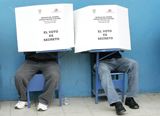Ecuadorean President Rafael Correa celebrated victory yesterday after exit polls showed voters had handed him a second term in office.
“My first words are of profound gratitude to the Ecuadoran people inside and outside the country ... because we’ve won overwhelmingly,” Correa told a news conference in the southern town and opposition stronghold of Guayaquil.
Shortly beforehand, three exit polls gave Correa 54 to 55 percent of the vote.

PHOTO: AP
A partial official tally put him ahead with 49 percent of the ballot, with his main opponent, nationalist Lucio Gutierrez, trailing far behind with 31.6 percent.
Only slightly over 11 percent of the ballots have been officially counted.
“We’ve made history,” Correa said, although it was still uncertain if his party would garner a majority in elections for Congress, likely key for his pursuit of a socialist agenda.
But Gutierrez was not ready to accept defeat. “The results announced aren’t official, don’t give up the vote count,” he said.
“This is a war of information,” Gutierrez said, claiming “fraud” had been committed.
Since coming to power in 2006, 46-year-old Correa has been a close ally of regional leftists, including Venezuelan President Hugo Chavez.
ECONOMIST
The economist has taken a tough stance with investors and refused to repay foreign debt, in moves welcomed by supporters who blame the effects of the economic crisis on foreign liberalism.
Correa had nearly two years left of his current term as president but a new Constitution approved last year let him bid to start over again.
He has promised to pursue popular social programs funded by oil wealth in the OPEC nation, where 38 percent of the population lives below the poverty line.
But the challenge will be tougher this time as the economic crisis lowers the prices of oil, the country’s main export, and remittances from immigrants abroad — at least 10 percent of the population.
The fight for the 124-seat Congress is still unclear.
Opinion polls give Correa’s ruling Alianza Pais party 60 seats, with the rest in the hands of opposition parties.
In a split Congress, Correa would have to form a tricky coalition with Gutierrez’s Patriotic Society Party and the Institutional Renewal Party of National Action of right-wing billionaire Alvaro Noboa.
‘AUTHORITARIAN’
The opposition has already complained that Correa’s “authoritarian” government controlled the media during the election campaign.
The opposition accuses Correa’s government of wasting state funds through bad management and worsening the impact of the crisis.
Correa seeks to continue his policies, despite foreign debt of US$10 billion, representing 19.7 percent of Ecuador’s GDP. The president declared a moratorium on one third of the debt last December.
“First [look after] our own, first social policies, and afterwards we can service the debt,” Correa said last week.
Since coming to power, Correa has launched a state radio and television channel and a weekly program in which he speaks to the country, as well as several newspapers.
His re-election would give some stability to the world’s top banana exporter that has seen three of its previous presidents — between 1996 and 2006 — ousted before the end of their terms.

In the sweltering streets of Jakarta, buskers carry towering, hollow puppets and pass around a bucket for donations. Now, they fear becoming outlaws. City authorities said they would crack down on use of the sacred ondel-ondel puppets, which can stand as tall as a truck, and they are drafting legislation to remove what they view as a street nuisance. Performances featuring the puppets — originally used by Jakarta’s Betawi people to ward off evil spirits — would be allowed only at set events. The ban could leave many ondel-ondel buskers in Jakarta jobless. “I am confused and anxious. I fear getting raided or even

Eleven people, including a former minister, were arrested in Serbia on Friday over a train station disaster in which 16 people died. The concrete canopy of the newly renovated station in the northern city of Novi Sad collapsed on Nov. 1, 2024 in a disaster widely blamed on corruption and poor oversight. It sparked a wave of student-led protests and led to the resignation of then-Serbian prime minister Milos Vucevic and the fall of his government. The public prosecutor’s office in Novi Sad opened an investigation into the accident and deaths. In February, the public prosecutor’s office for organized crime opened another probe into

RISING RACISM: A Japanese group called on China to assure safety in the country, while the Chinese embassy in Tokyo urged action against a ‘surge in xenophobia’ A Japanese woman living in China was attacked and injured by a man in a subway station in Suzhou, China, Japanese media said, hours after two Chinese men were seriously injured in violence in Tokyo. The attacks on Thursday raised concern about xenophobic sentiment in China and Japan that have been blamed for assaults in both countries. It was the third attack involving Japanese living in China since last year. In the two previous cases in China, Chinese authorities have insisted they were isolated incidents. Japanese broadcaster NHK did not identify the woman injured in Suzhou by name, but, citing the Japanese

RESTRUCTURE: Myanmar’s military has ended emergency rule and announced plans for elections in December, but critics said the move aims to entrench junta control Myanmar’s military government announced on Thursday that it was ending the state of emergency declared after it seized power in 2021 and would restructure administrative bodies to prepare for the new election at the end of the year. However, the polls planned for an unspecified date in December face serious obstacles, including a civil war raging over most of the country and pledges by opponents of the military rule to derail the election because they believe it can be neither free nor fair. Under the restructuring, Myanmar’s junta chief Min Aung Hlaing is giving up two posts, but would stay at the